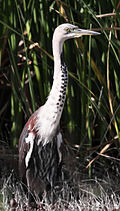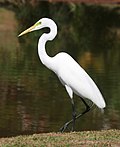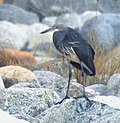Ardea (bird)
| Ardea Temporal range: Middle Miocene to present | |
|---|---|

| |
| Great blue heron (A. herodias) | |
| Scientific classification | |
| Domain: | Eukaryota |
| Kingdom: | Animalia |
| Phylum: | Chordata |
| Class: | Aves |
| Order: | Pelecaniformes |
| Family: | Ardeidae |
| Subfamily: | Ardeinae |
| Genus: | Ardea Linnaeus, 1758 |
| Type species | |
| Ardea cinerea (grey heron) Linnaeus, 1758 | |
| Species | |
|
12, see text | |
| Synonyms | |
Ardea is a genus of herons. These herons are generally large in size, typically 80–100 cm or more in length.
These large herons are associated with wetlands where they prey on fish, frogs, and other aquatic species. Most members of this almost worldwide group breed colonially in trees, building large stick nests.
Northern species such as great blue, grey, and purple herons may migrate south in winter, although the first two do so only from areas where the waters freeze.
Description

These are powerful birds with large spear-like bills, long necks and long legs, which hunt by waiting motionless or stalking their prey in shallow water before seizing it with a sudden lunge. They have a slow steady flight, with the neck retracted as is characteristic of herons and bitterns; this distinguishes them from storks, cranes, flamingos, and spoonbills, which extend their necks.
Taxonomy
The genus Ardea was introduced in 1758 by the Swedish naturalist Carl Linnaeus in 1758 in the tenth edition of his Systema Naturae.[1] The genus name comes from the Latin word ardea meaning "heron".[2] The type species was designated as the grey heron (Ardea cinerea) by George Robert Gray in 1840.[3]
Some members of Ardea are clearly very closely related, such as the grey, great blue, and cocoi herons, which form a superspecies. However, the great egret, in particular, has been placed in other genera by various authors as Egretta alba and Casmerodius albus. Nevertheless, this species closely resembles the large Ardea herons in everything but color, whereas it shows fewer similarities to the smaller white egrets.
Species
The genus contains 16 species:[4]
| Image | Scientific name | Common Name | Distribution |
|---|---|---|---|
 |
Ardea pacifica | White-necked heron or Pacific heron | Australia. |
 |
Ardea alba | Great egret, great white heron or white egret | Most of Asia south from Russia; sub-Saharan Africa and the Mediterranean; North, Central and South America; the Caribbean islands. |
 |
Ardea brachyrhyncha | Yellow-billed egret | Sub-Saharan Africa |
 |
Ardea intermedia | Medium egret | Southeast Asia, Indochina. |
 |
Ardea plumifera | Plumed egret | Australia and eastern Indonesia |
 |
Ardea ibis | Western cattle egret | Southern Europe to Iran, Africa, Indian Ocean Islands, North to South America |
 |
Ardea coromanda | Eastern cattle egret | South and Southeast Asia, Australasia |
 |
Ardea cinerea | Grey heron | Norway, Sweden, and most Northern European countries; Asia, east from Myanmar, the Indian Subcontinent, Iran, Iraq, the Ural and Caucasus regions; Green Spain, Mediterranean islands, south of France, Italy, the Balkans, the Adriatic; Sub-Saharan Africa, the Canary Islands, coastal Morocco, Algeria, Tunisia, Libya, Egypt. |
 |
Ardea herodias | Great blue heron | North America, as far north as Alaska and the southern Canadian provinces in summer; winter migrating is along waterways of the southernmost mainland United States, the coastal Gulf states, from Florida west to the California coast; most states of México, all of Central America; most Caribbean islands; northern South America (north of Argentina). |
 |
Ardea cocoi | Cocoi heron | South America. |
 |
Ardea purpurea | Purple heron | Africa; central and southern Europe; South and East Asia. |
 |
Ardea humbloti | Humblot's heron | Madagascar. |
 |
Ardea insignis | White-bellied heron | Eastern Himalayas of India and Myanmar. |
 |
Ardea sumatrana | Great-billed heron | South Asia, Indochina; Australasia, Indonesia, the Philippines. |
 |
Ardea melanocephala | Black-headed heron | Sub-Saharan Africa and Madagascar. |
 |
Ardea goliath | Goliath heron | Sub-Saharan Africa; small population in South Asia. |
A number of Ardea species are only known from subfossil or fossil bones. Their placement in Ardea versus Egretta may be provisional:
- Bennu heron, Ardea bennuides (prehistoric)
- Ardea sp. (Middle Miocene of Observation Quarry, US) (fossil)
- Ardea sp. (Late Miocene of Love Bone Bed, US) (fossil)
- Ardea polkensis (Early Pliocene of Bone Valley, US) (fossil)
- Ardea sp. (Early Pleistocene of Macasphalt Shell Pit, US) (fossil)
- Ardea howardae (fossil)
The remains described as Ardea perplexa are nowadays usually believed to be from an ibis of the genus Geronticus or a closely related genera. "Ardea formosa" (a nomen nudum) is now Proardeola; "Ardea" brunhuberi and "A." similis refer to a misidentified cormorant (Phalacrocorax intermedius) and partridge (Miogallus altus), respectively. "Ardea" lignitum – a fossil of quite recent age as it seems – is a type of large owl, perhaps even a Eurasian eagle-owl (Bubo bubo).
References
- ^ Linnaeus, Carl (1758). Systema Naturae per regna tria naturae, secundum classes, ordines, genera, species, cum characteribus, differentiis, synonymis, locis (in Latin). Vol. 1 (10th ed.). Holmiae (Stockholm): Laurentii Salvii. p. 141.
- ^ Jobling, James A. (2010). The Helm Dictionary of Scientific Bird Names. London: Christopher Helm. p. 54. ISBN 978-1-4081-2501-4.
- ^ Gray, George Robert (1840). A List of the Genera of Birds : with an Indication of the Typical Species of Each Genus. London: R. and J.E. Taylor. p. 66.
- ^ Gill, Frank; Donsker, David; Rasmussen, Pamela, eds. (August 2024). "Ibis, spoonbills, herons, Hamerkop, Shoebill, pelicans". IOC World Bird List Version 14.2. International Ornithologists' Union. Retrieved 26 September 2024.


